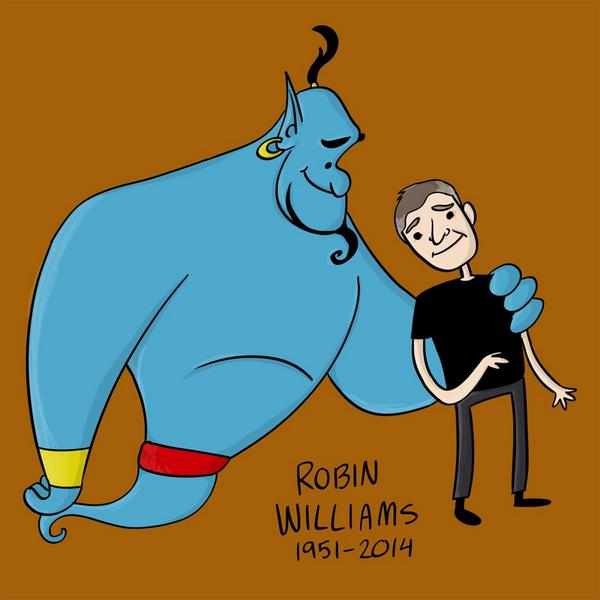Welcome back to Legal Geek. This week, we honor the recently-passed Robin Williams and take a look at whether there are any legal effects caused by the commission of suicide.
https://archive.org/details/LegalGeekEp21
On Monday, news broke that famous comedian and actor Robin Williams had died at the age of 63. He certainly made the world a better and happier place with his art, and he will be sorely missed. Sadly, it appears that his death was a suicide likely fueled by the depression he has battled with for many years. Even though the subject is hopelessly morbid, this begs the question: what, if anything, are the legal ramifications of suicide?
Certainly if you've ever looked over a life insurance policy, you are likely aware that most policies deny payout in the event of suicide, but only if that happens within a set time period in the contract such as the first two years the policy is in effect. While insurance payouts are hopefully not an issue for the family of Robin Williams, it is something to be aware of. This is just based on contract though, not the law itself.
Almost all current laws dealing with suicide are criminal laws regarding assisting someone else commit suicide. Many states had laws on record making suicide itself a felony up through about the 1960's, but no state still has any such law on the books (and they were rarely, if ever, enforced back when these laws existed, because the person is already dead). Regardless, some states still hold that suicide is a common law crime, under judge made law, and this can bar damages recovery for the deceased's family in an ongoing lawsuit, in some circumstances. Essentially, this long shot is the only significant effect of suicide that may be legally binding on the survivors.
There is no automatic loss of copyrights or other IP rights as a result of suicide. Indeed, the estate of someone artistic like Williams may very well hold some valuable copyrights for the next 70 years past his death, and this may be a continued revenue stream for his heirs for many years to come. So beware bloggers, you may want to be careful with using the copyrighted clips and pictures of Williams that will inevitably be shared like wildfire over the next few days and weeks.
Bottom Line: Suicide and depression simply stink, and we lost a great one this week. Although his family will have plenty to grieve about in the coming months, at least this act carries essentially no adverse legal consequences for them. Let's hope we as a society find better ways to help those who need it in the future, as none of us should have to experience the devastation that is suicide.
And Robin, we will miss you. "You ain't never had a friend like me." Indeed, we haven't.

(copyright Carter Johnson, check out her stuff @carterejohnson)
Thanks for reading. Please provide feedback and legal-themed questions as segment suggestions to me on Twitter @BuckeyeFitzy or in the comments below.
On Monday, news broke that famous comedian and actor Robin Williams had died at the age of 63. He certainly made the world a better and happier place with his art, and he will be sorely missed. Sadly, it appears that his death was a suicide likely fueled by the depression he has battled with for many years. Even though the subject is hopelessly morbid, this begs the question: what, if anything, are the legal ramifications of suicide?
Certainly if you've ever looked over a life insurance policy, you are likely aware that most policies deny payout in the event of suicide, but only if that happens within a set time period in the contract such as the first two years the policy is in effect. While insurance payouts are hopefully not an issue for the family of Robin Williams, it is something to be aware of. This is just based on contract though, not the law itself.
Almost all current laws dealing with suicide are criminal laws regarding assisting someone else commit suicide. Many states had laws on record making suicide itself a felony up through about the 1960's, but no state still has any such law on the books (and they were rarely, if ever, enforced back when these laws existed, because the person is already dead). Regardless, some states still hold that suicide is a common law crime, under judge made law, and this can bar damages recovery for the deceased's family in an ongoing lawsuit, in some circumstances. Essentially, this long shot is the only significant effect of suicide that may be legally binding on the survivors.
There is no automatic loss of copyrights or other IP rights as a result of suicide. Indeed, the estate of someone artistic like Williams may very well hold some valuable copyrights for the next 70 years past his death, and this may be a continued revenue stream for his heirs for many years to come. So beware bloggers, you may want to be careful with using the copyrighted clips and pictures of Williams that will inevitably be shared like wildfire over the next few days and weeks.
Bottom Line: Suicide and depression simply stink, and we lost a great one this week. Although his family will have plenty to grieve about in the coming months, at least this act carries essentially no adverse legal consequences for them. Let's hope we as a society find better ways to help those who need it in the future, as none of us should have to experience the devastation that is suicide.
And Robin, we will miss you. "You ain't never had a friend like me." Indeed, we haven't.

(copyright Carter Johnson, check out her stuff @carterejohnson)
Thanks for reading. Please provide feedback and legal-themed questions as segment suggestions to me on Twitter @BuckeyeFitzy or in the comments below.
No comments:
Post a Comment